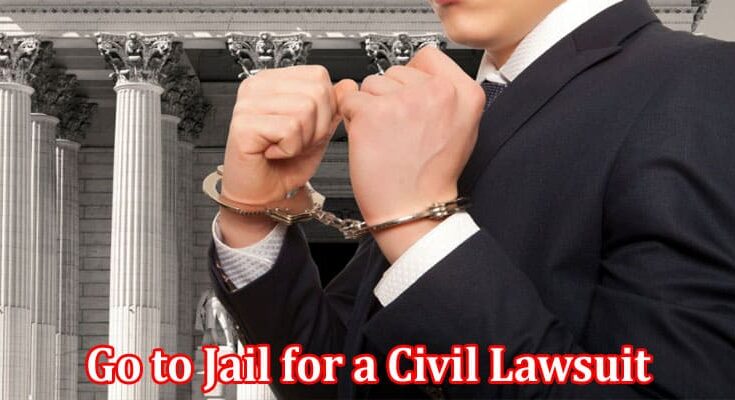Civil lawsuits are a common occurrence in the legal system, where private parties seek compensation or remedy for harm suffered as a result of another party’s actions or inactions. While civil lawsuits don’t usually result in jail time, there are some situations where a person may face the possibility of imprisonment. In this blog post, we’ll explore the three situations where a person may face the possibility of jail time in connection with a civil lawsuit and how a criminal defense lawyer can assist you.
Three Situations Where You May Face the Possibility of Jail Time in a Civil Lawsuit
When most people think of going to jail, they often associate it with criminal charges. However, some may wonder if it’s possible to go to jail for a civil lawsuit.
The short answer is no, you cannot go to jail for a civil lawsuit. Civil lawsuits involve disputes between private parties, such as individuals, companies, or organizations. The purpose of a civil lawsuit is to seek compensation or remedy for harm suffered by one party as a result of the other party’s actions or inactions.
However, there are a few situations where a person may face the possibility of jail time in connection with a civil lawsuit:
Contempt of Court
If you fail to comply with a court order, such as failing to pay a court-ordered judgment or violating a restraining order, you may be held in contempt of court. Contempt of court is not a civil lawsuit, but rather a criminal charge that can result in fines or imprisonment.
Contempt of court occurs when a person fails to obey a court order or shows disrespect for the court’s authority. The most common type of contempt of court in civil cases is for failing to comply with a court order. For example, if a court orders you to pay a certain amount of money to the other party in a civil lawsuit, and you fail to do so, you may be held in contempt of court.
Contempt of court can be either civil or criminal. Civil contempt of court is used to enforce a court order or to compensate the other party for damages caused by your failure to comply with the court order. Civil contempt can result in fines or other penalties until the offending party complies with the court order.
Criminal contempt of court, on the other hand, is used to punish a person for disobeying a court order or for showing disrespect for the court’s authority. Criminal contempt can result in fines or imprisonment. The imprisonment is usually for a short period, such as a few days or a few weeks, but it can last for longer periods in extreme cases.
Fraud
If a civil lawsuit involves fraud or other criminal activity, the parties involved may be subject to criminal charges. For example, if a party committed fraud in connection with a contract dispute, they may face criminal charges for fraud in addition to the civil lawsuit.
Fraud is a deliberate misrepresentation or deception of facts with the intent to induce another person to act or refrain from acting. If a party to a civil lawsuit commits fraud, they may face both civil and criminal charges. The civil charges would seek to recover any damages or losses caused by the fraud, while the criminal charges would seek to punish the offender.
Criminal Contempt
In some cases, a court may issue an order in a civil lawsuit that is also a criminal offense. For example, a court may order a party to stop harassing the other party. If the harassing behavior continues, the offending party may be held in criminal contempt of court, which can result in fines or imprisonment.
Criminal contempt of court occurs when a person violates a court order that is also a criminal offense. For example, if a court issues a restraining order to prevent a person from contacting another person, and the offending person continues to contact the protected person, they may be held in criminal contempt of court.
It’s essential to remember that civil lawsuits are separate from criminal charges. In a civil lawsuit, the parties seek to resolve a dispute and obtain compensation or remedy for harm suffered. In contrast, criminal charges involve the state or federal government accusing an individual of committing a crime and seeking to punish them for that crime.
Seek Legal Assistance if You’re Facing Criminal Charges in Connection with a Civil Lawsuit
In conclusion, while it’s not possible to go to jail for a civil lawsuit, there are some situations where a person may face the possibility of jail time. These situations include contempt of court, fraud, and criminal contempt. If you are involved in a civil lawsuit and are concerned about the possibility of facing criminal charges, it’s essential to consult with an experienced attorney who can advise you on your legal options and help you navigate the legal process.
If you are facing contempt of court or other criminal charges related to a civil lawsuit, it’s crucial to seek the assistance of a criminal defense attorney. An experienced attorney can help you understand your legal rights and options, as well as work to protect your interests and defend your case in court. Contact a criminal defense attorney in your area today to discuss your case and find out how they can help you.

Caroline is a dedicated writer with a passion for keeping readers informed. Specializing in providing the latest news updates and unbiased reviews, she strives to deliver accurate and insightful content. With a keen eye for detail and a commitment to journalistic integrity, Caroline ensures that her readers are always well-informed. Stay tuned for her latest articles to stay up-to-date on current events and trends.




